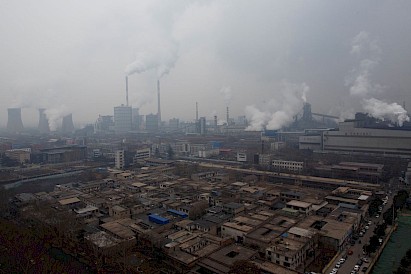China has "long way to go" to meet ecological goals
 China has a “long way to go” on environmental protection, its State Council acknowledged on Sunday, as it announced an “in-depth” fight against pollution with new targets for cleaner air and water and measures to tackle carbon emissions.
China has a “long way to go” on environmental protection, its State Council acknowledged on Sunday, as it announced an “in-depth” fight against pollution with new targets for cleaner air and water and measures to tackle carbon emissions.
The State Council, China’s cabinet, said there had been some improvements in the country’s ecological situation since the launch of its anti-pollution campaign, state news agency Xinhua reported.
But the Council said it would be tough to tackle pollution and ensure that carbon emissions peaked in 2030 and that carbon neutrality was achieved by 2060, as promised by President Xi Jinping.
China is the world’s biggest emitter of greenhouse gases.
“The ecological and environment protection campaign has a long way to go,” the Council said in a statement.
China aims to bring the proportion of good water quality in its coastal regions up to 79%, to basically eliminate heavy polluted weather, to effectively control soil pollution risks and to significantly enhance the capability of treating solid waste and new pollutants, the Council said.
The government also vowed to cut the amount of volatile organic compounds (VOCs), mainly emitted by petroleum and chemical industries, and nitrogen oxides by at least 10% in 2025 from 2020 levels, to halt the rise in ground ozone pollution.
It will try to meet its ambitious environmental goals without major disruption of economic and industrial activity and people’s everyday lives, the Council said, adding that the environmental fight will also coordinate with other national actions including energy and food security campaigns.
The State Council aims to make around 93% of its contaminated farmland fit for crops by the end of 2025, up from 90% set for the end of 2020, and to reduce heavy metal waste discharged by key industries by 5% from their 2020 levels.
China will focus on key sectors such as energy, steel and transport in its efforts to curb carbon emissions, it said.
President Xi has faced criticism, including from U.S. President Joe Biden, for not attending the U.N. climate gathering now underway in Glasgow, Scotland.
Beijing has also not offered new targets in the non-binding national climate change plans, known as NDCs, that must be submitted regularly to the United Nations as part of the 2015 Paris Agreement on tackling climate change.
China has submitted updated nationally determined contributions (NDCs) to fight climate change, a UN registry showed on Thursday, formally boosting headline emission-cutting pledges but offering nothing new ahead of key climate talks in Glasgow.
The submission documents, published on the website of the UN Framework Convention on Climate Change (UNFCCC), showed that China aims to see its carbon dioxide emissions peak before 2030 and to become carbon neutral before 2060, enshrining earlier pledges made by President Xi Jinping.
China, the world’s biggest emitter of greenhouse gases, also formalised a commitment to raising the share of non-fossil fuels in its primary energy consumption to 25% by 2030, higher than a previous pledge of 20%, and increasing wind and solar power capacity to more than 1,200 gigawatts.
NDCs are non-binding national climate change plans that must be submitted regularly to the United Nations as part of the 2015 Paris Agreement, with countries expected to “enhance ambition” if they are able to do so.
Some experts had been hoping for more from China, however, ahead of the UN Climate Change Conference in Glasgow, known as COP26, which begins on Sunday. A Chinese government official said this week the main priority of Glasgow was to establish a $100 billion a year fund that richer countries will pay into for the developing world to help mitigate climate risks. read more
Li Shuo, a policy adviser at Greenpeace China, said Beijing’s lack of new pledges “casts a shadow on the global climate effort.”
“In light of the domestic economic uncertainties, the country appears hesitant to embrace stronger near term targets, and missed an opportunity to demonstrate ambition,” Li said in emailed comments.
China is currently grappling with its worst electricity shortages in years and has asked miners to increase production of coal to supply power plants. It relies on coal-fired power generation, a major contributor to carbon emissions, for almost 60% of its electricity.
“Six years after the Paris Agreement, China’s choice epitomizes the lack of determination to step up climate action among some of the major economies,” Li said.
You can return to the main Market News page, or press the Back button on your browser.

